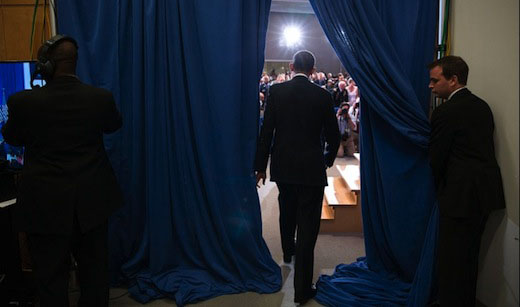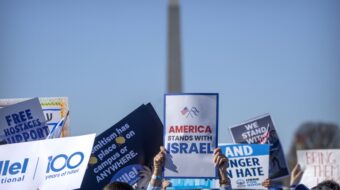
In a speech at the National Defense University yesterday President Barack Obama declared the nation must move away from the “state of perpetual war” that has existed since 9/11. He repeated President James Madison’s warning, “No nation could preserve its freedom in the midst of continual warfare.”
The president issued his call in a speech addressing controversies over the carrying out of drone strikes, U.S. efforts to break hunger strikes by Guantanamo Bay prisoners who have long been approved for transfer and seizures of Associated Press records.
In the speech, the president defended his administration’s use of drones, arguing that the policy has stopped terrorists who clearly were about to carry out major attacks on Americans, international aviation or other targets important to the United States. He said, on the issue of U.S. citizens having been among those killed, that citizenship cannot be used as a “shield” to protect someone engaging in or planning an attack on Americans.
Civil liberties and human rights groups immediately took issue with those arguments.
“The president still claims broad authority to carry out target killings from any battlefield, and there is still insufficient transparency,” Anthony Romero, executive director of the American Civil Liberties Union, said in a statement. “We continue to disagree fundamentally with the idea that due process requirements can be satisfied without any form of judicial oversight by federal courts.”
President Obama said that in keeping with his intention to move the nation out of its state of “perpetual” war he will slash the number of drone attacks, send Guantanamo detainees who were eligible for transfer to Yemen and step up efforts to shut down Guantanamo altogether. He said the CIA will cede its control over the drone war to the Pentagon in six months, opening the way for greater transparency. Pentagon budgets are the subject of public discussion, CIA budgets are not.
Clearly indicative that the administration has felt the pressure of antiwar critics was the president’s request that people imagine, 20 years from now, how the continued presence of Guantanamo would be explained. “History will cast a harsh judgement on this aspect of our fight against terrorism, and those of us who failed to end it,” he declared.
It hasn’t been lost on leaders in the peace movement that the president’s speech yesterday reflected concerns that their movement has been raising since 9/11.
“The peace movement has been steadily pressing for demilitarization of foreign policy,” said Judith LeBlanc, national coordinator for Peace Action. “The speech shows we have had an impact and now we will have to step up our efforts.”
Obama promised to engage Congress about the existing Authorization to Use Military Force, calling it “near obsolete” and in need of eventual repeal. He threatened to veto any proposal that expanded the so-called “war” on terror and he said drones will not be used after U.S. ground forces leave Afghanistan.
“While there are some, particularly the more hawkish Congressional Republicans, who say this war should last forever,” The New York times wrote editorially after the president’s speech. “Mr. Obama told the world that the United States must return to a state in which counterterrorism is handled, as it was before 2001, primarily by law enforcement and the intelligence agencies. That shift is essential to preserving the democratic system and the rule of law for which the United States is fighting, and for repairing its badly damaged global image.”
Obama also promised to curtail the use of “lethal force” to only those targets considered to be “continuing, imminent threats to Americans” even as he acknowledged for the first time that drone attacks have killed civilians.
The president declassified the official information that the U.S. killed Anwar al-Awlaki and three other Americans. While defending al-Awlaki as a justifiable security threat, the administration is now saying the other three deaths, including aw-Awlaki’s 16-year old son, were not specifically targeted.
The Center for Constitutional Rights said in response to the president’s comments on use of lethal force against individuals, including Americans, that “though the president suggested a return to normal at some point in the future, the essence of his speech was to reassert the legally-flawed and dangerous premise of the targeted killing program – namely that the U.S. continues to be engaged in a global war with Al Qaeda and undefined ‘associated forces.'”
The civil liberties group acknowledged the “imminent danger” policy change was “narrower” than the previous policy, but it also “raised questions” and “despite its ‘refinements,’ sets a dangerous precedent for future administrations and other countries.”
Yesterday’s speech also reflected pressure on the administration resulting from Justice Department collection of phone records from Associated Press journalists. Obama has asked Congress to pass a law that would protect the press.
“Journalists should not be at legal risk for doing their jobs. Our focus must be on those who break the law,” he said. “That is why I have called on Congress to pass a media shield law to guard against government overreach.”
He said that there will be consultations with the media and a report on a new whistleblower set of guidelines by July 12.
Photo: President Barack Obama prepares to take the stage as he is introduced at the National Defense University at Fort McNair in Washington, D.C., May 23, 2013. (White House/Pete Souza)

MOST POPULAR TODAY

Zionist organizations leading campaign to stop ceasefire resolutions in D.C. area

High Court essentially bans demonstrations, freedom of assembly in Deep South

U.S. imperialism’s ‘ironclad’ support for Israel increases fascist danger at home


UN warns that Israel is still blocking humanitarian aid to Gaza






Comments